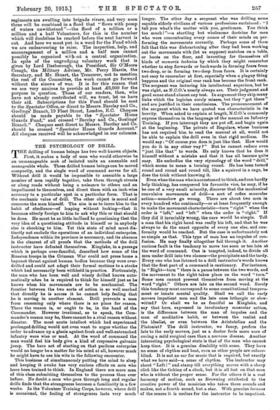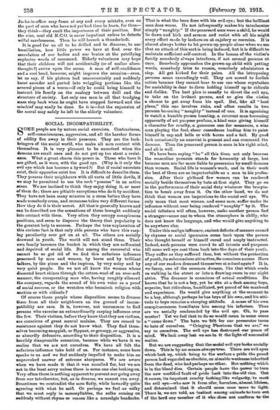THE PSYCHOLOGY OF DRILL.
THE drilling of human beings has two well-known objects. First, it makes a body of men who would otherwise be an unmanageable mob of isolated units an amenable and manageable whole. These drilled human beings can be moved compactly, and the single word of command serves for all. Without drill it would be impossible to assemble a large number of men rapidly together, take them through streets or along roads without being a nuisance to others and an impediment to themselves, and direct them with an inch-wise accuracy to a particular spot in a particular form. That is the mechanic value of drill. The other object is moral and concerns the man himself. The aim is so to inure him to the habit of obedience—of leaping without looking—that it becomes utterly foreign to him to ask why this or that should be done. He must be so little inclined to questioning that the very idea of a questioning attitude in himself or in anybody else is shocking to him. Yet this state of mind must dis- tinctly not exclude the operations of an individual enterprise. Independence within its province is necessary, and its absence is the clearest of all proofs that the methods of the drill instructor have defeated themselves. Kinglake, in a passage which is perhaps over-fanciful, described how some of the Russian troops in the Crimean War could not press home a bayonet thrust against human bodies because they were over- drilled and could not adapt their formal motions to a stroke which had necessarily been withheld in practice. Fortunately, the man who has been well and wisely drilled knows auto- matically when he is required to think for himself just as he knows when his movements are to be mechanical. The frontier between the two sorts of action is so well marked that directly he is across it he cannot help feeling that he is moving in another element. Drill prevents a man from reasoning only where there is no place for reason. There the reason is, or ought to be, in the head of the Commander. However irrational, so to speak, the Com- mander's reason may be, there cannot be a rival reason without disaster. The most acute intellect which had experienced prolonged drilling would not even want to argue whether the order to advance up a glacis against fresh and well-entrenched infantry were wise or mad. At the word of command the man would feel his body give a kind of responsive galvanic jump. The bare act of starting on that perilous enterprise would no longer be a matter for his mind at all, however much he might have to use his wits in the following encounter.
This business of simultaneously putting the mind to sleep and keeping it awake has very curious effects on men who have been trained to think. In England there are more men of this class submitting themselves to the process than ever before. No doubt a man who goes through long and regular drills finds that the strangeness becomes a familiarity in a few weeks. In the Volunteer Training Corps, however, where drill is occasional, the feeling of strangeness lasts very much longer. The other day a sergeant who was drilling some capable elderly civilians of various professions exclaimed : "I tell you what's the matter with you, gentlemen. You think too much ! "—a startling but wholesome doctrine for men who were concentrating every ounce of their minds on per- forming the movements correctly. Perhaps some of them felt that this was disheartening after they had been working out the movements with (let us suppose) matches on a table, or boots on the floor, and inventing for themselves all kinds of inemoria techniee by which they might remember whether to step forwards or backwards in forming four, from two-deep, or in forming two-deep from fours. It is certainly not easy to remember at first, especially when a plaguy thing happens and the original rear rank has become the front rank. The sergeant was lecturing his intellectual superiors, but be was right, as N.C.O.'s nearly always are. Their judgment and good sense stand almost any teat. In argument they skip many links which the logician sorely misses, but they "get there" and are justified in their conclusions. The pronouncement of the sergeant which we have quoted was characteristic in its brevity. When asked to explain at length, N.C.O.'s commonly express themselves in the language of the manual on Infantry Training. If you interrupt they are pot off, and begin again at the beginning. The private of Regulars, whose business has not required him to read the manual at all, would not be able to explain the drill even in that rigid medium. He would say: "Of course you does it just like that. How would you do it in any other way ?" But he cannot reduce even "just like that" to words. He only knows that be does it himself without a mistake and that it has all become quite easy. He embodies the very etymology of the word " drill," which seems to mean a turning round. He has been turned round and round and round till, like a squirrel in a cage, he does the trick without knowing it.
Even when the man who ie accustomed to think, and can hardly help thinking, has conquered his favourite vice, he may, if he be one of a very small minority, discover that the mechanical convulsive movements of drill—a sort of reflex muscular action—somehow go wrong. There are about two men in every hundred who continually—or at least frequently enough to make the movement characteristic—turn " right " when the order is " left," and " left " when the order is "right" It they did it invariably wrong, the cure would be simple. Tell a man that his right hand was really his left, and that be was always to do the exact opposite of every one else, and con- formity would be reached. But the case is unfortunately not so simple as that This type of man has an impulse of con- fusion. He may finally altogether fail through it. Another curious fault is the tendency to move too soon or too late at the word of command. One is tempted, indeed, to divide all men under drill into two classes—the precipitate and the tardy. Every one who has listened to a drill instructor's words knows that the first part of a command is cautionary. For instance. in "Right—turn " there is a pause between the two words, and the movement to the right takes place on the word " turn." Some men cannot prevent themselves from moving at the word "right" Others are late on the second word. Surely this tendency must correspond to some constitutional tempera- ment or innate mental quality. Shall we call the early movers impatient men and the late ones lethargic or slow- witted? Or shall we be as fanciful as Ringlake, and say that here, expressed in involuntary muscular action, is the difference between the man of impulse and the man of meditative habit, or between the realist and the idealist, or even between the Aristotelian and the Platonist? The drill instructor, we fancy, prefers the late to the early movers, just as a doctor feels more sure of curing a mild surgical case than a nervous disease. Another interesting psychological state is that of the man who cannot keep time. It is a genuine disability with some. They have no sense of rhythm and beat, even as other people are colour- blind. It ie not an ear for music that is required, but exactly what we have said—a sense of rhythm. The instructor may shout "Left ! " and stamp till everything moves with a sharp click like the ticking of a clock, but it is all lost on that man who is without the proper sense. For the others it is a real harmony of motion, such as Browning attributed to the creative power of the musician who takes three sounds and makes, not a fourth sound, but a star. With genuine lacunae of the senses it is useless for the instructor to be impatient. Jacks-in-office may fume at any and every mistake, even on the part of men who have not yethad time to learn, for thus— they think—they exahlhe importance of their position. But the wise, cool old N.C.O. is never impatient unless be detects wilful carelessness. Then he will launch a thunderbolt.
It is good for us all to be drilled and to discover:to our humiliation, how little power we have at first over the correlation of our bodies and our brains at the petrifying explosive words of command. Elderly volunteers may hope that their children will not accidentally (or of malice afore- thought?) arrive upon the scene. A man of self-confidence and a cool bead, however, might improve the occasion—even,. let us say, if his platoon had unaccountably and suddenly burst asunder and parted into wriggling portions like the severed pieces of a worm—if only be could bring himself to instruct his family on the analogy between drill and the structure of society. Let only one man in all that trudging mass step back when he ought have stepped forward and the mischief may easily be done. So it is—but the expansion of the moral may safely be left to the elderly volunteer.







































 Previous page
Previous page